Kathmandu: On the morning of Sunday, the day after his arrival in Nepal, United Nations (UN) Secretary-General Antonio Guterres engaged in high-level discussions with political parties as part of his four-day official visit.
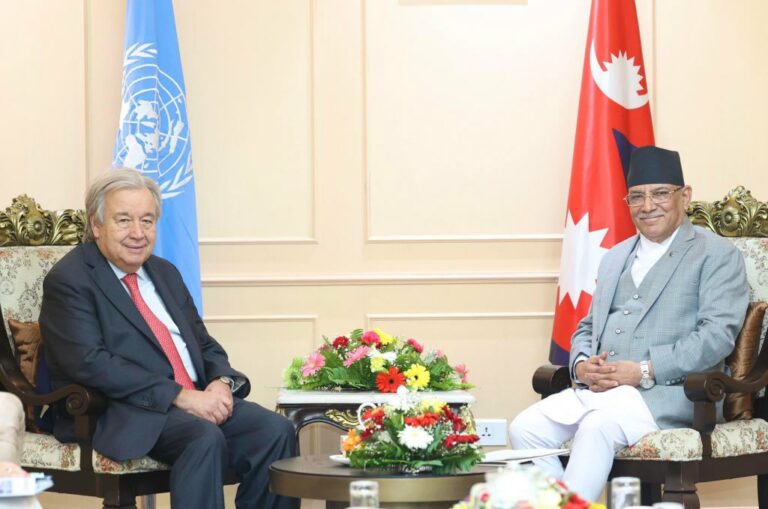
After holding similar discussions with Prime Minister Pushpa Kamal Dahal Prachanda, Secretary-General Guterres stressed the need for UN support to facilitate peace processes and transitional justice. Notably, he expressed his readiness to pass the Transitional Justice Bill (TRC Bill) on various aspects of the issue, as he was encouraged by the party leaders.
In this context, some leaders from the Nepal Communist Party (UML) expressed various concerns. In particular, the matter of a possible power grab by the UN in Nepal has raised concerns. They suggest that the UN’s presence in Nepal could potentially seek to exert political influence. In the wake of the TRC Bill, they argue that there should be a reconsideration of the agreement.
According to Mahesh Bartaula, a UML parliamentarian and close aide of KP Sharma Oli, the core issues of the peace process and transitional justice should be taken into account, and there should be no pressure or influence by outside actors. He expressed that the discussion on the proposed bill for the Truth and Reconciliation Commission (TRC) should be critically examined in detail. The proposed bill, which seeks to pass the Commission of Inquiry, Truth and Reconciliation (Second Amendment) Bill, 2071, has caused contention among different political parties. The bill is currently under consideration in the Parliamentary Law, Justice, and Human Rights Subcommittee. Bartaula, a member of the Sub-committee, stated that the bill had been passed by Parliament without undergoing extensive discussions.
The concerns highlighted in this bill encompass four main areas:
- Regarding Transitional Justice: The proposed bill seeks to diminish the authority of the Conflict Victims Search Committee and reduce its jurisdiction, preventing it from participating in determining the penalties for the perpetrators of violent crimes during the conflict. It includes changes to the procedures for amnesty, investigation, and prosecution of those involved in the insurgency.
- Concerns Related to Victims: The proposed bill has provisions that could restrict victims from seeking justice and limit their participation in the justice process.
- Implementation Challenges: There are reservations regarding the bill’s feasibility and whether it aligns with international human rights standards.
- Discussion on Murder Cases: The proposal to include murder cases within the jurisdiction of the proposed bill has raised concerns, especially in the context of human rights violations.
It is important to note that the UN Secretary-General has suggested that parties should reach an agreement on these four main areas. However, the opposition within the UML is visible. Bartaula expresses, “The UN presence in Nepal should not be seen as a way to exert political influence; rather, it should respect the sovereignty of Nepal.” Guterres has suggested that the parties should reach an agreement on the issues at hand. The Law, Justice, and Human Rights Subcommittee are working to pass the proposed bill after it was ratified by Parliament. This issue raises concerns as the bill is under consideration, and it is important to address the concerns of the victim.
Earlier, the main opposition party, Nepal Communist Party (UML), Chair and former Prime Minister KP Sharma Oli, along with other UML leaders, informed United Nations (UN) Secretary-General Antonio Guterres about the difficulties they faced in expediting the peace process due to Prime Minister Pushpa Kamal Dahal’s moves to honor violent activities commemoratively. Oli mentioned that commemorating the day the Maoist insurgency began was making the peace process more challenging.
During a meeting with UN Secretary-General Guterres, Oli emphasized that the peace process should move forward smoothly. However, he pointed out that the current Prime Minister’s actions, particularly the commendation of violent activities, have complicated the peace process, making it less straightforward.
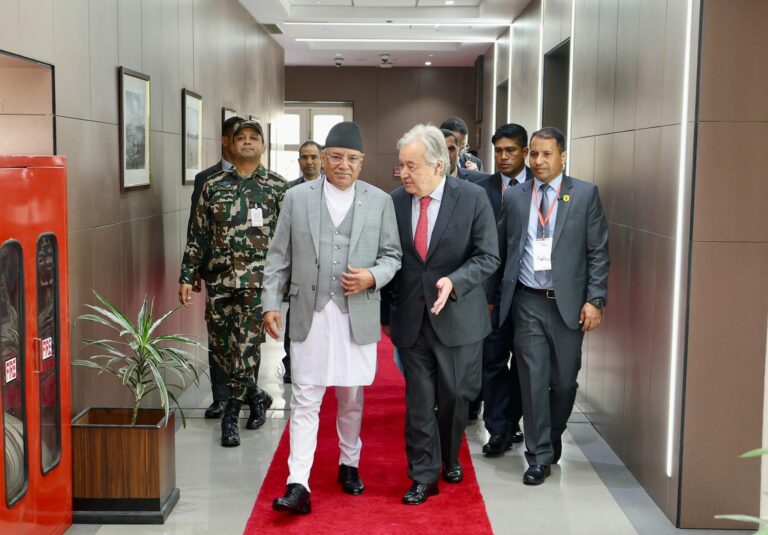
In light of this information, Deputy Chair of the UML, Pradeep Gyawali, commented that some of the Prime Minister’s actions had raised concerns. Specifically, he noted that the endorsement of activities related to the inception of the Maoist insurgency on that particular day had heightened the unease surrounding the peace process.
Oli further stressed that in the context of the peace process, it’s essential to consider the victims and work towards a swift resolution. He reiterated the importance of quickly facilitating the peace process but expressed discomfort regarding the actions taken by Prime Minister Dahal, especially in promoting violence during the conflict’s commemoration.
Oli also conveyed his party’s view that transitional justice should focus on ensuring justice for the victims, without providing any leniency for the perpetrators. He emphasized the need to ensure justice for victims and expedite the process.
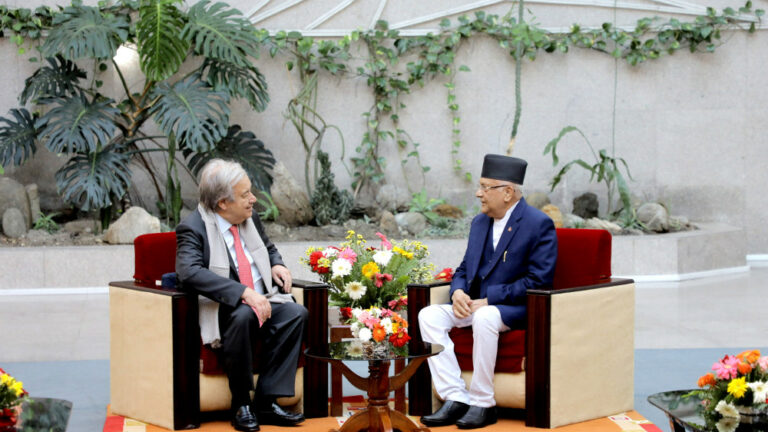
Additionally, Oli revealed that the actions and stance of the Prime Minister, who had been a rebel leader in the past, were contributing to making the peace process more challenging. The decision to commemorate the day the Maoist insurgency began has caused concerns and unease among victims.
In response, Guterres stated that he wanted to see these issues, such as the peace process, resolved swiftly. He mentioned that he wanted to facilitate the peace process and urged for a focus on the concerns of the victims. He encouraged parties to find common ground on these issues.
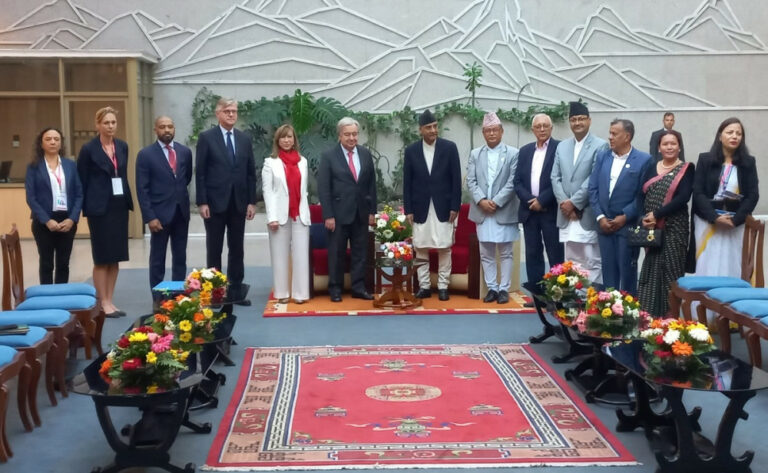
Overall, Oli expressed his commitment to expediting the peace process and stressed the importance of considering the victims, but he noted that the Prime Minister’s actions were making it more challenging. Guterres expressed his intention to help move the peace process forward quickly and expressed his desire for a development-oriented Nepal and a stronger UN presence in countries with development priorities. He also acknowledged that the commemoration of the day the Maoist insurgency began was causing difficulties in the peace process.


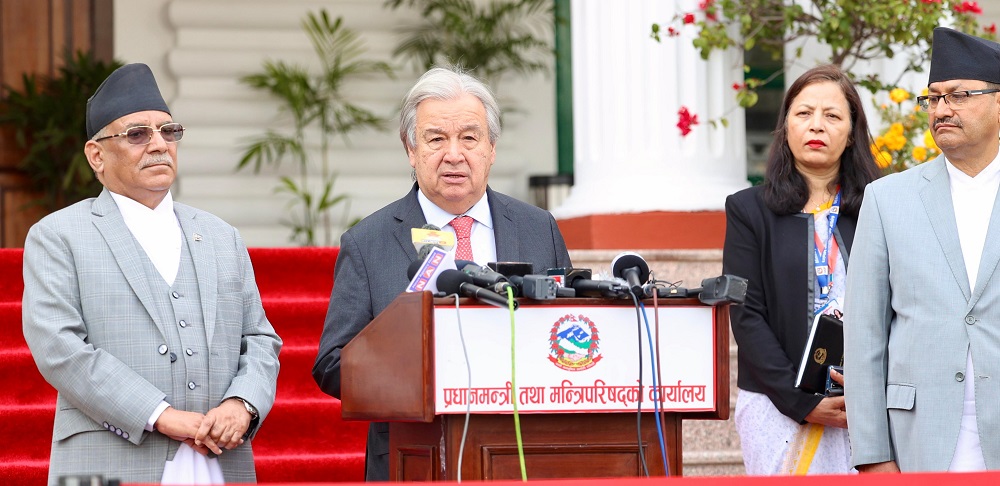

COMMENTS